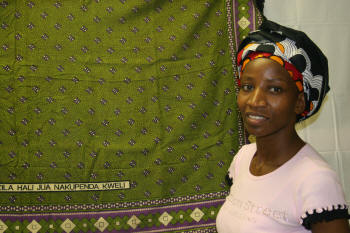University
Communications
Office
Arkansas State University
Jonesboro,
Arkansas
Staff
Markham Howe
Sara McNeil
Gina Bowman
(870) 972-3056
fax (870) 972-3693
More information:
NewsPage
Links to News Releases
& Announcements
Campus Calendar
Public activities at ASU
About
ASU
Overview, history
and more |
ASU Museum features new online exhibit, 'Wearing
What Cannot Be Spoken'
Feb. 18, 2009 --
The ASU Museum is offering a new
online exhibit, "Wearing
What Cannot Be Spoken."
This exhibition presents kanga--a type of cloth worn by
women of Zanzibar in East Africa to assert their claim to S wahili
identity and express socially taboo opinions in an acceptable manner.
In Swahili society today, women still find a voice in kanga to challenge
social, religious, and political ideals--literally wearing what cannot
be spoken. Although the
physical
exhibition was originally part of ASU's Black History Month
celebrations in 2008, the online exhibition allows viewers to explore
the culture of East Africa year-round. wahili
identity and express socially taboo opinions in an acceptable manner.
In Swahili society today, women still find a voice in kanga to challenge
social, religious, and political ideals--literally wearing what cannot
be spoken. Although the
physical
exhibition was originally part of ASU's Black History Month
celebrations in 2008, the online exhibition allows viewers to explore
the culture of East Africa year-round.
Visitors to the website see the colorful kangas collected by Rose Ong’oa
during her Heritage Studies PhD research in Zanzibar. A short audio
introduction in
English and
Swahili offers the opportunity
to compare the two languages and listen to the poetic rhythm of
Swahili. K-5 lesson plans assist teachers in bringing this rich cultural
experience to the classroom and include directions for designing a
kanga-card. The lessons align with Arkansas Curriculum Frameworks.
Kanga was originally a plain white cloth imported from the United States
in the 19th centrury. Worn by slaves in the U.S., it initially served
the same purpose on the East African coast.
After the abolition of East African slavery in 1897, women sought to
distance themselves from their slave past and align themselves with the
freeborn Swahili. Boldly asserting a right to participate in Swahili
society, they adopted the Moslem faith, learned Kiswahili (the language
of the Swahili people), and began hand-painting their clothing with
designs and proverbs long favored by free Swahili women.
For more information, visit the ASU Museum, 110 Cooley Drive, Jonesboro,
or visit online at
http://museum.astate.edu, or see the exhibition, "Wearing What
Cannot Be Spoken," at
http://www2.astate.edu/a/museum/wearing-what-cannot-be-spoken-page-1.dot.
For information about the museum and its programs,
contact Lenore Shoults, ext.
2074, or e-mail her at
lshoults@astate.edu.
###
Photo: Rose Ong’oa, an
Arkansas State University Heritage Studies PhD student researched
kanga—a garment worn by women in Zanzibar, East Africa. The textile has
ancient roots as clothing and today serves that purpose and as a means
of communication for women.
|
